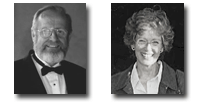


Sunday, November 18, 2001
Chautauqua lecturers, musicians filled tent
Sabine Goerke-Shrode
sm.shrode@sbcglobal.netTraveling show hit town in 1917
During the late 19th century, education and entertainment often went hand in hand. One of the many establishments to combine the two was the Chautauqua Institution in the town of Chautauqua in New York state.
Founded in 1874 by John Heyl Vincent as a lyceum, the movement’s original intent was purely religious, functioning as an assembly for the training of Sunday school teachers and church workers.
Eventually, the program grew to include general education and popular entertainment. Under Vincent, the institution offered summer lectures and classes as well as a program of directed home reading and correspondence study. By 1900, the Chautauqua assembly included a school of theology, the correspondence school, and a publishing house.
During the following years, the institution’s success led to the founding of numerous “chautauquas,” modeled after the original. By the turn of the 20th century, more than 400 existed in the United States, moving from community to community to educate and entertain their audience. Numerous booking agents scoured the country to supply the needed educational or inspirational speakers, entertainers and musicians.
One of those speakers was Russell Herman Conwell, lawyer, author and clergyman, whose lecture “Acres of Diamonds,” which extolled his formula of success, was heard more than 6,000 times, bringing him fame and wealth.
So it is no great wonder that Vacaville’s citizens eagerly awaited their turn. Most likely a group of citizens formed a local circle.
According to the 1885 Chautauqua Pocket Manual found in the Allison store in Elmira, “two or three members only are sufficient to constitute such a local circle. ... Meetings are of great value, as they enable the members of the local circle to review together the subjects they have read, to obtain information on given topics supplementary to that contained in the textbook, to mutually discipline and strengthen mind and memory, to stimulate and encourage each other in daily reading, to promote friendship and social intercourse, and to attract the attention of the community to the Chautauqua Literary and Scientific Circle.”
Finally, in May 1917, Chautauqua came to Vacaville. A local committee formed to promote the event and sell tickets. The Vacaville Reporter wrote on May 18, 1917: “The Chautauqua committee held a meeting last Monday evening and completed the final arrangements for the local campaign. All reports seemed favorable, but it was realized that an active canvass would have to be made to complete the sale of the required number of tickets, although those who had agreed to take tickets are generally responding.
“Chautauqua boosters will visit Elmira and Winters on Friday to interest the residents of those towns in the excellent programs offered, and Saturday was designated as ticket day, when a united effort will be made to complete the sale of the tickets. An automobile parade will also be made a feature.
“There will be no more season tickets sold after Wednesday noon, the opening day. See the local committee and get your ticket now for only $2.50. After opening day it will cost you $3.”
A big tent was erected opposite The Reporter building to house the visitors. The program, according to The Reporter, promised a variety of lectures: “Governor Carlson, ‘The Francis J. Heney of Colorado,’ will be heard in his stirring address, ‘The Price of Progress.’ Dr. Andrew Johnson, noted American humorist, will give the most popular of his lectures, ‘Eli and Dennis.’ William A. Bone, Illinois’ poet-philosopher, will deliver his great lecture, ‘The House of Man.’ Then comes Dr. G. Whitefield Ray, F.R.G.S., of London, noted explorer, called the ‘Livingston of South America,’ in his thrilling lecture, ‘Through Five Republics on Horseback.’ “
The musical performers guaranteed an equally attractive and varied program, as The Reporter advertised on May 4: “The Royal Venetian Band, conducted by Signor Joseph Lo Zito, famous Italian Director, gives two concerts on the fourth day of the Chautauqua, one of the most liberal contracts ever made. ... Mary Adel Hays, American prima donna soprano of New York has been specially engaged as soloist for the evening concerts.”
While the musical entertainment also included the Filion Concert Party in a program of the classics, the Lyric Glee Club, the Military Girls’ Singing Orchestra and Graus’ Tyrolean Alpine Yodlers, the Royal Venetian Band was definitely the main attraction.
This was confirmed in The Reporter’s summary a few days after the event: “Chautauqua has come and gone, and the great majority of those who attended are much pleased with what they heard. The programs, of course, were diversified in character, and were not of equal excellence, as was to be expected, but, as a whole, they were instructive and entertaining.
“The Royal Venetian Band and Mary Adel Hays, coloratura soprano, was by far the greatest musical feature of the course. The band is one of the finest musical organizations that ever visited Vacaville, and Miss Hays’ solos won repeated encores from her delighted hearers. It is seldom an artist of her ability is heard in a town the size of Vacaville.”
One local citizen, Luther Harbison, who attended the whole series of events, summarized his impressions on the Chautauqua in his daily notebook, confirming The Reporter’s evaluation. On Wednesday, May 23, he noted: “Attended Chitauqua. Bum like the above spelling.” On the following day: “Attended Chautauqua. Spelling improved. Performance no better.” On Friday: “Chautauqua in afternoon not elevating or helpful. I mean the lecture part.” But finally, on Saturday, May 26: “Royal Venetian Band. Grand. Worth more than the cost of the whole course. Satisfying.”
Though the heyday of the Chautauqua movement peaked in the 1920s, the institution exists at Lake Chautauqua to this day, offering symphony concerts, operas, plays, university summer school courses and lectures.


